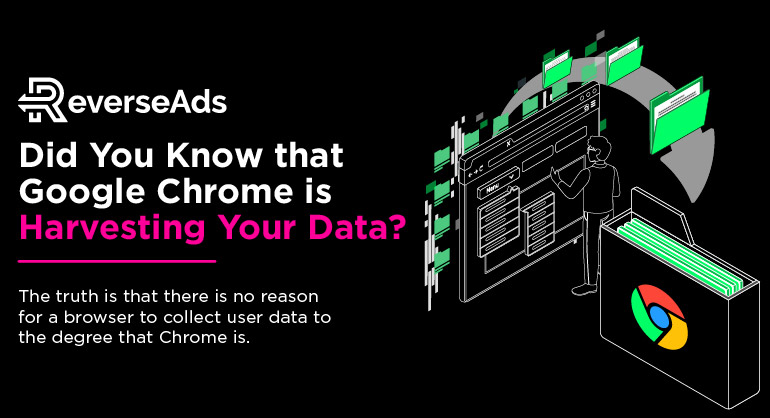Did You Know that Google Chrome is Harvesting Your Data?

Don’t feel like reading? Listen to this blog instead
The laundry list of potential privacy violations carried out by Google is nothing short of terrifying. The world’s largest tech giant continues to find itself in hot water over data harvesting scandals. The latest of which comes in the form of its globally recognized web browser, Chrome. Thanks to Apple’s disclosure requirements related to user data collection, the veil of secrecy surrounding Chrome has finally been lifted.
As soon as Google disclosed the information related to Chrome’s data collection practices, it became clear that it was out of alignment with platforms like Safari and Firefox. This discrepancy between platforms flies in the face of Google’s “privacy first web” messaging, as it demonstrated that it has been unjustly harvesting data in order to fuel its monetization of its users. Google isn’t the only company under fire for malicious behavior, as Facebook is also in the spotlight.

Google is unique when compared to competitors, in that it operates in two worlds. On one side, it is claiming to protect user data and privacy across its many software platforms including Gmail, YouTube, Google Drive, etc. However, on the other side Google is running the world’s largest advertising ecosystem, generating billions of dollars in revenue by using its data to help businesses target users with ads online. When a company’s entire business model is designed to monetize users, it is going to do everything it can to collect and sell the data generated by those users. Google wants to have its cake and eat it too.
Three months after Apple made the addition of privacy labels mandatory, Google launched its update containing these labels. This makes it possible for the world to see just how empty this Tech Giant’s commitment to user privacy is.
One of the primary distinctions between Google’s data collection and its competitors (Safari, Edge, Firefox), is that Google collects user’s ID and device ID while linking harvested data to devices and thus individuals. Other search engines are not linking user data, locations, and browsing history to its users. To put it simply, Chrome is collecting more data than any competitor’s browser AND links this collection of data to each individual user’s identity. This practice goes beyond anything that other browsers are doing, which is why Google is exhibiting little interest in user privacy.
As these stories break, and Google’s data usage continues to demonstrate a lack of concern for privacy, it becomes hard justify the use and existence of a potentially harmful technology. Google claims that this level of intrusion is necessary for the company to deliver services to users, however most other apps deliver equally as powerful solutions and performance without the overreach.
This news of Chrome’s data harvesting comes on the heels of criticism regarding Google’s decision to replace cookies with FLoC. The reason that these two stories are inseparable is because FLoC actually empowers Google by increasing its control over user data. The FLoC approach is managed by a user’s browser, and 60% of users turn to Chrome as their primary web browser.
This correlation of events must be strongly considered by all users of Google and Chrome. Do you want your search data to be collected and analyzed by a corporation that has allegedly tracked users without permission? Would you consider using an alternate platform if you know that your data would not be harvested in the same way?
The truth is that there is no reason for a browser to collect user data to the degree that Chrome is. Browsers don’t need this data to improve functionality, so clearly something much more sinister is at work.
We have been witnessing the slow decay of user privacy across the internet, and Google has been at the heart of this potentially catastrophic process. Privacy is being exchanged for profit that flows directly into the advertising arms of Tech Giants like Google and Facebook. Users are now the products, and our data is being sold like hot cakes in order to generate ad revenue for big tech.
Balance must be restored, as user privacy should be prioritized by all tech companies, especially those in advertising. Everyone from personal users to professional media buyers must reevaluate their use of products and services from companies like Google. We all have the power to reclaim the internet and return it to the people in a way that ensures privacy and protects our future.





